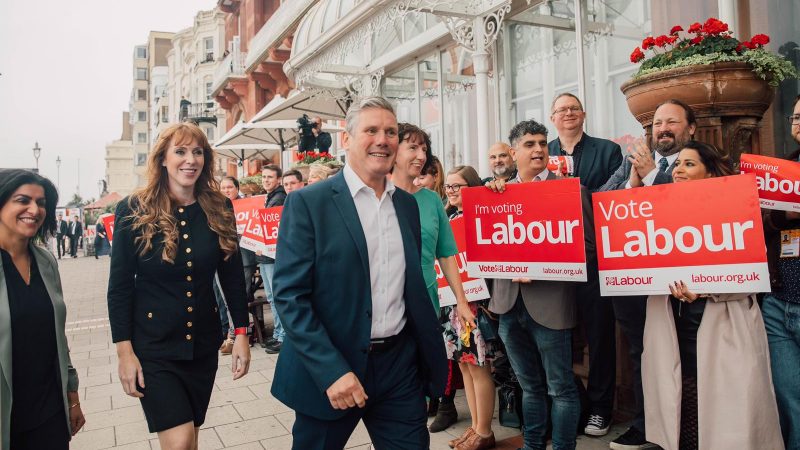
Keir Starmer faces the biggest moment of his leadership today. After 18 months of delivering speeches to empty rooms, and having them ignored as the country focuses on coronavirus, the Labour leader now has the opportunity to speak unfiltered to the public at the precise moment that politics starts returning to normal. He will use the conference speech at 12pm today, we are told, to “stand before the nation and declare who he is, where he has come from and how his background and his values inform the politician he has become”. The address will also “introduce the principles on which Starmer’s politics are based”: both a response to internal critics who wonder whether he has any politics, and a bid to connect with the electorate.
The theme is that UK politics is small, too insubstantial to confront the huge challenges ahead. “The questions we face in Britain today are big ones. How we emerge from the biggest pandemic in a century. How we make our living in a competitive world. The climate crisis. Our relationship with Europe. The future of our union,” he will say. “These are big issues. But our politics is so small. So our politics needs to grow to meet the scale of the challenge.”
Underlying this is another key message, the same as the one that the leadership has sent throughout this conference: I am not Jeremy Corbyn and Labour has changed. This was the thrust of the speech he gave at the online ‘Connected’ conference last year, too, when ‘A new leadership’ was the strapline. He was introduced by Jewish Labour Movement chair Ruth Smeeth, then, and in a similar development this year Louise Ellman has announced during conference that she is rejoining the party. Will Starmer talk about antisemitism today or leave the EHRC rule changes on Sunday to speak for themselves?
The speech is being touted as a “forceful diagnosis of the state of Britain after the pandemic” that will spell out the short-term failures of the Tories (the fuel and cost of living crises). And the solution will be framed by the idea of a “contribution society”, as Starmer set out in the recent Fabians pamphlet. He will tell conference that the government is “lost in the woods” with a fork in the path: one where Covid lessons are not learnt, and one where they are. The second path “leads to a future in which a smart government enlists the brilliance of scientific invention to create an economy in which people are healthy and well-educated. A contribution society in which everyone has their role to play.”
There will be a commitment to mental health treatment being available within the month for anyone needing it, facilitated by 8,500 new staff, under a Labour government. This would be funded by closing tax loopholes and removing the VAT exemption from private schools. This is related to Wes Streeting’s stated ambition of making private education redundant and leads to the other policy announcement we already know of: a ‘national excellence programme’, which would boost the number of outstanding schools across the country and drive up standards with thousands of new teachers, ongoing training and reforms to Ofsted.
A Labour source said: “Keir’s speech will be noticeably different from what you’ve heard from Labour in recent years. It will be more optimistic, more focused on the future, more outward-looking. The speech will be a demonstration of the way the Labour party has changed. It will be a clear indication that Labour will never again go into an election with a manifesto that isn’t a serious plan for government.” This source quote underlines just how different Starmer is now to the Starmer seen in the leadership campaign last year. In an interview yesterday, he said “winning” was more important than “unity”. 18 months ago, he might have replied that one cannot be achieved without the other.
There has been non-stop chatter in Brighton about who will succeed Starmer, which is not exactly ideal for a leader’s first in-person conference. It reflects just how deeply pessimistic many Labour MPs, including frontbenchers, are about the party’s chances of winning the next election. But it is also because Starmer has shown two very different faces since he rose to prominence, and party insiders who have watched every speech and interview given since April 2020 may be no wiser about who Starmer is than the general public who haven’t seen much of him. Not only must the Labour leader communicate his vision to the country today – he also needs to offer definition, through an hour-long speech rather than rule changes, to connect with his party.
Sign up to LabourList’s morning email for everything Labour, every weekday morning.



More from LabourList
‘Security in the 21st century means more than just defence’
‘Better the devil you know’: what Gorton and Denton voters say about by-election
‘Unity or division’: Starmer’s message to voters in Gorton and Denton